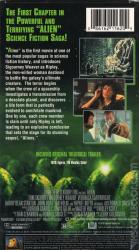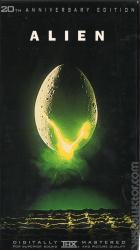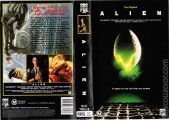Alien
Catalog Number
4111620
-
Primary Distributor (If not listed, select "OTHER")
Catalog Number
4111620
Primary Distributor (If not listed, select "OTHER")
Release Year
Country
116 mins (NTSC)
N/A | N/A | N/A
N/A | N/A
Alien (1979)
Additional Information
Additional Information
Alien is a 1979 British-American science fiction-horror film directed by Ridley Scott, and starring Tom Skerritt, Sigourney Weaver, Veronica Cartwright, Harry Dean Stanton, John Hurt, Ian Holm and Yaphet Kotto. The film's title refers to a highly aggressive extraterrestrial creature that stalks and kills the crew of a spaceship. Dan O'Bannon wrote the screenplay from a story he wrote with Ronald Shusett, drawing influence from previous works of science fiction and horror. The film was produced by Gordon Carroll, David Giler and Walter Hill through their Brandywine Productions and distributed by 20th Century Fox. Giler and Hill made revisions and additions to the script. Shusett was executive producer. The eponymous Alien and its accompanying elements were designed by Swiss surrealist artist H. R. Giger, while concept artists Ron Cobb and Chris Foss designed the human aspects of the film. Alien launched the Alien franchise and is chronologically the first of the main series, with the prequel series set in an earlier timeframe.
Alien received both critical acclaim and box office success, receiving an Academy Award for Best Visual Effects,[10][11] Saturn Awards for Best Science Fiction Film, Best Direction for Scott, and Best Supporting Actress for Cartwright,[12] and a Hugo Award for Best Dramatic Presentation, along with numerous other award nominations.[13] It has remained highly praised in subsequent decades, being considered one of the greatest films of all time. In 2002, the film was deemed "culturally, historically or aesthetically significant" by the Library of Congress and was selected for preservation in the United States National Film Registry.[13][14][15] In 2008, it was ranked as the seventh-best film in the science fiction genre by the American Film Institute, and as the 33rd greatest film of all time by Empire magazine.[16][17]
The success of Alien spawned a media franchise of novels, comic books, video games, and toys. It also launched Weaver's acting career by providing her with her first lead role, and the story of her character Ellen Ripley's encounters with the Alien creatures became the thematic thread that ran through the sequels Aliens (1986), Alien 3 (1992) and Alien: Resurrection (1997).[18] A crossover with the Predator franchise produced the Alien vs. Predator series, which includes Alien vs. Predator (2004) and Aliens vs. Predator: Requiem (2007). A prequel series, which includes Prometheus (2012) and Alien: Covenant (2017), continues in development.[19]
Alien has been released in many home video formats and packages over the years. The first of these was a seventeen-minute Super-8 version for home projectionists.[81] It was also released on both VHS and Betamax for rental, which grossed it an additional $40,300,000 in the United States alone.[56] Several VHS releases were subsequently sold both singly and as boxed sets. LaserDisc and Videodisc versions followed, including deleted scenes and director commentary as bonus features.[81][93] A VHS box set containing Alien and its sequels Aliens and Alien 3 was released in facehugger-shaped boxes, and included some of the deleted scenes from the Laserdisc editions.[93] When Alien: Resurrection premiered in theaters, another set of the first three films was released including a Making of Alien: Resurrection tape. A few months later the set was re-released with the full version of Alien: Resurrection taking the place of the making-of video.[93] Alien was released on DVD in 1999, both singly and, as The Alien Legacy, packaged with Aliens, Alien 3 and Alien: Resurrection.[94] This set, which was also released in a VHS version, included a commentary track by Ridley Scott.[81][93] The first three films of the series have also been packaged as the Alien Triple Pack.
"The traditional definition of the term 'Director's Cut' suggests the restoration of a director's original vision, free of any creative limitations. It suggests that the filmmaker has finally overcome the interference of heavy-handed studio executives, and that the film has been restored to its original, untampered form. Such is not the case with Alien: The Director's Cut. It's a completely different beast."[95]
—Ridley Scott
In 2003 20th Century Fox was preparing the Alien Quadrilogy DVD box set, which would include Alien and its three sequels. In addition, the set would also include alternate versions of all four films in the form of "special editions" and "director's cuts". Fox approached Ridley Scott to digitally restore and remaster Alien, and to restore several scenes which had been cut during the editing process for inclusion in an expanded version of the film.[95] Upon viewing the expanded version, Scott felt that it was too long and chose to recut it into a more streamlined alternate version:
Upon viewing the proposed expanded version of the film, I felt that the cut was simply too long and the pacing completely thrown off. After all, I cut those scenes out for a reason back in 1979. However, in the interest of giving the fans a new experience with Alien, I figured there had to be an appropriate middle ground. I chose to go in and recut that proposed long version into a more streamlined and polished alternate version of the film. For marketing purposes, this version is being called "The Director's Cut."[95]
The "Director's Cut" restored roughly four minutes of deleted footage while cutting about five minutes of other material, leaving it about a minute shorter than the theatrical cut.[56] Many of the changes were minor, such as altered sound effects, while the restored footage included the scene in which Ripley discovers the cocooned Dallas and Brett during her escape of the Nostromo. Fox decided to release the Director's Cut in theaters, and it premiered on October 31, 2003.[56] The Alien Quadrilogy box set was released December 2, 2003, with both versions of the film included along with a new commentary track featuring many of the film's actors, writers, and production staff, as well as other special features and a documentary entitled The Beast Within: The Making of Alien. Each film was also released separately as a DVD with both versions of the film included. Scott noted that he was very pleased with the original theatrical cut of Alien, saying that "For all intents and purposes, I felt that the original cut of Alien was perfect. I still feel that way", and that the original 1979 theatrical version "remains my version of choice".[95] He has since stated that he considers both versions "director's cuts", as he feels that the 1979 version was the best he could possibly have made it at the time.[95]
The Alien Quadrilogy set earned Alien a number of new awards and nominations. It won DVDX Exclusive Awards for Best Audio Commentary and Best Overall DVD, Classic Movie, and was also nominated for Best Behind-the-Scenes Program and Best Menu Design.[13] It also won a Sierra Award for Best DVD, and was nominated for a Saturn Award for Best DVD Collection and Golden Satellite Awards for Best DVD Extras and Best Overall DVD.[13] In 2010 both the theatrical version and Director's Cut of Alien were released on Blu-ray Disc, as a stand-alone release and as part of the Alien Anthology set.[96]
In 2014, to mark the film's 35th anniversary, a special re-release box set named Alien: 35th Anniversary Edition, containing the film on Blu-ray, a digital copy, a reprint of Alien: The Illustrated Story, and a series of collectible art cards containing artwork by H.R. Giger related to the film, was released.[97] The disk itself is the same as the respective disk on the 2010 Anthology Blu-ray release, and contains MU-TH-UR mode, despite the lack of the required bonus disk.[jargon] A reprint of the novel by Alan Dean Foster was also released.
Alien received both critical acclaim and box office success, receiving an Academy Award for Best Visual Effects,[10][11] Saturn Awards for Best Science Fiction Film, Best Direction for Scott, and Best Supporting Actress for Cartwright,[12] and a Hugo Award for Best Dramatic Presentation, along with numerous other award nominations.[13] It has remained highly praised in subsequent decades, being considered one of the greatest films of all time. In 2002, the film was deemed "culturally, historically or aesthetically significant" by the Library of Congress and was selected for preservation in the United States National Film Registry.[13][14][15] In 2008, it was ranked as the seventh-best film in the science fiction genre by the American Film Institute, and as the 33rd greatest film of all time by Empire magazine.[16][17]
The success of Alien spawned a media franchise of novels, comic books, video games, and toys. It also launched Weaver's acting career by providing her with her first lead role, and the story of her character Ellen Ripley's encounters with the Alien creatures became the thematic thread that ran through the sequels Aliens (1986), Alien 3 (1992) and Alien: Resurrection (1997).[18] A crossover with the Predator franchise produced the Alien vs. Predator series, which includes Alien vs. Predator (2004) and Aliens vs. Predator: Requiem (2007). A prequel series, which includes Prometheus (2012) and Alien: Covenant (2017), continues in development.[19]
Alien has been released in many home video formats and packages over the years. The first of these was a seventeen-minute Super-8 version for home projectionists.[81] It was also released on both VHS and Betamax for rental, which grossed it an additional $40,300,000 in the United States alone.[56] Several VHS releases were subsequently sold both singly and as boxed sets. LaserDisc and Videodisc versions followed, including deleted scenes and director commentary as bonus features.[81][93] A VHS box set containing Alien and its sequels Aliens and Alien 3 was released in facehugger-shaped boxes, and included some of the deleted scenes from the Laserdisc editions.[93] When Alien: Resurrection premiered in theaters, another set of the first three films was released including a Making of Alien: Resurrection tape. A few months later the set was re-released with the full version of Alien: Resurrection taking the place of the making-of video.[93] Alien was released on DVD in 1999, both singly and, as The Alien Legacy, packaged with Aliens, Alien 3 and Alien: Resurrection.[94] This set, which was also released in a VHS version, included a commentary track by Ridley Scott.[81][93] The first three films of the series have also been packaged as the Alien Triple Pack.
"The traditional definition of the term 'Director's Cut' suggests the restoration of a director's original vision, free of any creative limitations. It suggests that the filmmaker has finally overcome the interference of heavy-handed studio executives, and that the film has been restored to its original, untampered form. Such is not the case with Alien: The Director's Cut. It's a completely different beast."[95]
—Ridley Scott
In 2003 20th Century Fox was preparing the Alien Quadrilogy DVD box set, which would include Alien and its three sequels. In addition, the set would also include alternate versions of all four films in the form of "special editions" and "director's cuts". Fox approached Ridley Scott to digitally restore and remaster Alien, and to restore several scenes which had been cut during the editing process for inclusion in an expanded version of the film.[95] Upon viewing the expanded version, Scott felt that it was too long and chose to recut it into a more streamlined alternate version:
Upon viewing the proposed expanded version of the film, I felt that the cut was simply too long and the pacing completely thrown off. After all, I cut those scenes out for a reason back in 1979. However, in the interest of giving the fans a new experience with Alien, I figured there had to be an appropriate middle ground. I chose to go in and recut that proposed long version into a more streamlined and polished alternate version of the film. For marketing purposes, this version is being called "The Director's Cut."[95]
The "Director's Cut" restored roughly four minutes of deleted footage while cutting about five minutes of other material, leaving it about a minute shorter than the theatrical cut.[56] Many of the changes were minor, such as altered sound effects, while the restored footage included the scene in which Ripley discovers the cocooned Dallas and Brett during her escape of the Nostromo. Fox decided to release the Director's Cut in theaters, and it premiered on October 31, 2003.[56] The Alien Quadrilogy box set was released December 2, 2003, with both versions of the film included along with a new commentary track featuring many of the film's actors, writers, and production staff, as well as other special features and a documentary entitled The Beast Within: The Making of Alien. Each film was also released separately as a DVD with both versions of the film included. Scott noted that he was very pleased with the original theatrical cut of Alien, saying that "For all intents and purposes, I felt that the original cut of Alien was perfect. I still feel that way", and that the original 1979 theatrical version "remains my version of choice".[95] He has since stated that he considers both versions "director's cuts", as he feels that the 1979 version was the best he could possibly have made it at the time.[95]
The Alien Quadrilogy set earned Alien a number of new awards and nominations. It won DVDX Exclusive Awards for Best Audio Commentary and Best Overall DVD, Classic Movie, and was also nominated for Best Behind-the-Scenes Program and Best Menu Design.[13] It also won a Sierra Award for Best DVD, and was nominated for a Saturn Award for Best DVD Collection and Golden Satellite Awards for Best DVD Extras and Best Overall DVD.[13] In 2010 both the theatrical version and Director's Cut of Alien were released on Blu-ray Disc, as a stand-alone release and as part of the Alien Anthology set.[96]
In 2014, to mark the film's 35th anniversary, a special re-release box set named Alien: 35th Anniversary Edition, containing the film on Blu-ray, a digital copy, a reprint of Alien: The Illustrated Story, and a series of collectible art cards containing artwork by H.R. Giger related to the film, was released.[97] The disk itself is the same as the respective disk on the 2010 Anthology Blu-ray release, and contains MU-TH-UR mode, despite the lack of the required bonus disk.[jargon] A reprint of the novel by Alan Dean Foster was also released.
Related Releases5
Catalog Number
83158
Primary Distributor (If not listed, select "OTHER")
Alien (1979)
Release Year
Catalog Number
83158
Primary Distributor (If not listed, select "OTHER")
Catalog Number
83158
Catalog Number
1090
Primary Distributor (If not listed, select "OTHER")
Alien (1979)
Release Year
Catalog Number
1090
Primary Distributor (If not listed, select "OTHER")
Catalog Number
1090
Catalog Number
1090
Primary Distributor (If not listed, select "OTHER")
Alien (1979)
Release Year
Catalog Number
1090
Primary Distributor (If not listed, select "OTHER")
Catalog Number
1090
Catalog Number
1090
Primary Distributor (If not listed, select "OTHER")
Alien (1979)
Release Year
Catalog Number
1090
Primary Distributor (If not listed, select "OTHER")
Catalog Number
1090
Catalog Number
1090
Primary Distributor (If not listed, select "OTHER")
Alien (1979)
Release Year
Catalog Number
1090
Primary Distributor (If not listed, select "OTHER")
Catalog Number
1090

















Comments0
Login / Register to post comments